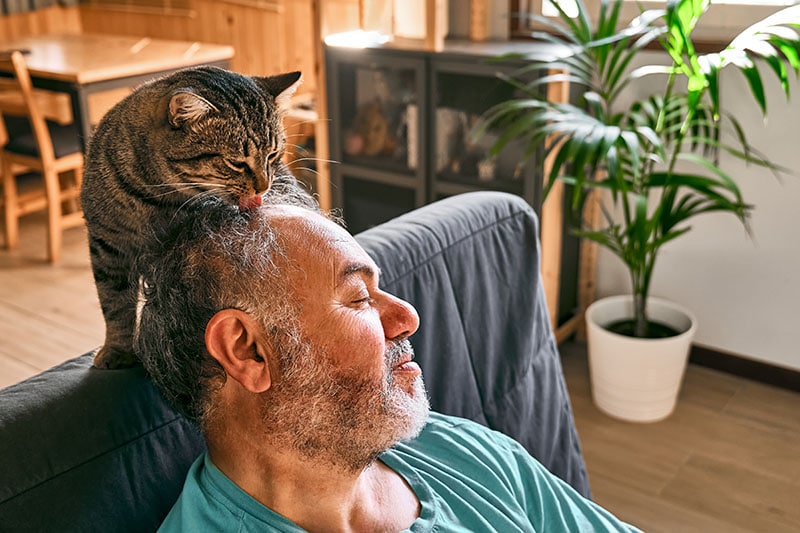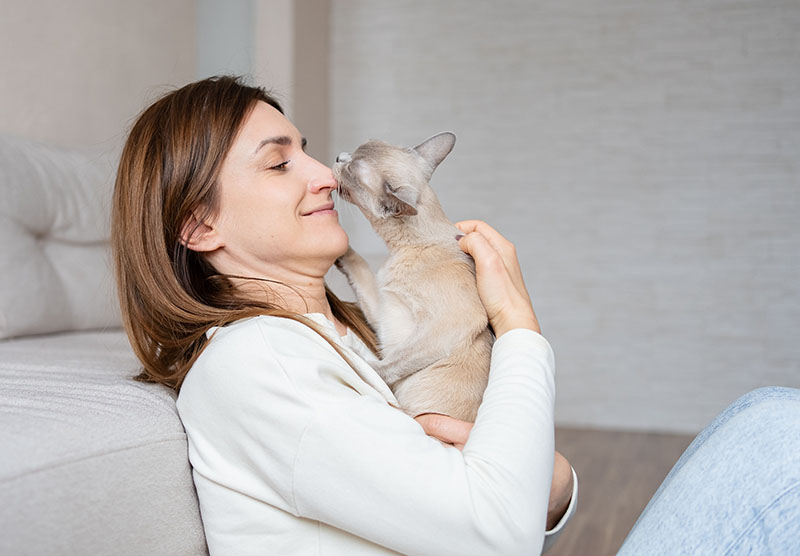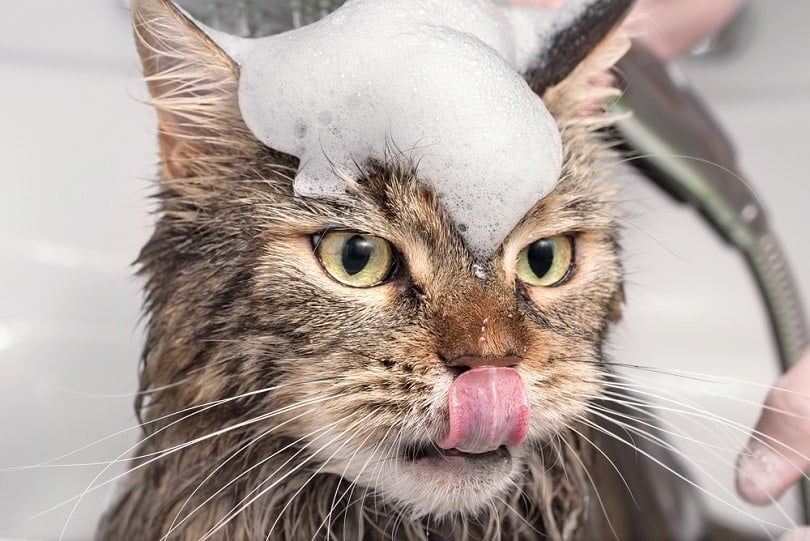
Click to Skip Ahead
Ever wondered why your cat licks your face sometimes? Usually, your cat will jump up, nuzzle your face, and shower you with gentle licks.
Face licking can be an endearing, puzzling, or gross behavior from your cat. Their decision to lick your face is rooted in factors such as a desire to show affection or attention seeking. Sometimes, the cat follows its instincts or tries to taste something interesting.
Whether you like your cat’s actions or not, it helps to understand what drives this behavior and what you can do about it. This article will explore face licking in cats and try to answer why your cat might want to lick your face.
The 5 Reasons Cat Lick Your Face
1. Instincts
One of the reasons why your cat licks your face is because it stems from their instincts. This is deeply ingrained in their nature and has evolved for important reasons. These include.
Grooming
Cats use licking to groom themselves and those around them. Grooming helps cats maintain hygiene by removing dirt, debris, and parasites from their fur.
A cat usually learns how to clean their companions using his tongue from a young age. Therefore, when your cat licks your face, they are probably exhibiting an instinct to care for you as they would care for themselves.
Social Bonding and Communication
Licking is also a means to develop social bonding. In their natural setting, cats groom each other to strengthen their social bonds within a group. When your cat licks your face, it may signal trust, affection, and a desire to include you in their social circle.
Scent Marking and Ownership
Your cat will also lick your face to mark you as theirs. Cats have scent glands on their faces that leave their scent behind when they lick you. This allows them to mark you as part of their territory and assert ownership. It also signals to other cats that you are under their protection.

2. It’s a Way of Showing Affection
Licking your face is a gesture of intimacy and closeness for cats. Like kissing in humans, cats also use licking to show affection to other cats and their human companions. There are two important things to note here.
Firstly, face licking in cats has evolved from the nurturing behavior they experienced as kittens. Mother cats groom their young, including licking their faces, to show care and to strengthen the maternal bond. Therefore, when your cat licks your face, it may be a way of mimicking this maternal behavior, signifying their deep attachment to you and their desire to nurture and protect you.
Secondly, your cat views you as a crucial member of his social group. Cats are naturally inclined to establish a social hierarchy, and by grooming you, they may recognize your role as a provider and protector. Since you are a close family member to them, licking your face reinforces your position.
It also indicates they are trying to convey affection and a bond with you.
3. As a Way to Seek Attention and Solicit Care
Cats are independent creatures. However, they sometimes seek attention and affection from their human companions. When your cat licks your face, it may be a way of seeking your attention and eliciting care.
Chances are, when your cat licks your face, you respond positively by petting, cuddling, or acknowledging their presence.
Furthermore, face licking can be a way to express their needs and desire for food, playtime, or simply some extra love and attention. Licking your face allows them to communicate their feelings and longing for your care and presence.

4. To Cope With Anxiety or Stress
Cats experience anxiety or stress in certain situations.
Licking, in this case, serves as a self-soothing mechanism for them. The repetitive motion and the release of endorphins can help reduce anxiety and promote relaxation. Your cat will use licking to self-soothe and find comfort in your presence.
Create a calm and enriching environment to help your cat cope with anxiety or stress and provide designated safe spaces where they can retreat when they feel overwhelmed. Also, regularly engage in interactive play sessions and provide mental stimulation through toys or puzzle feeders.
Establishing a consistent routine and offering plenty of love and attention can help alleviate their anxiety and strengthen your bond.
5. To Taste Something Interesting
Cats are naturally curious. Their sense of taste plays a significant role in exploring and interacting with their environment. When your cat licks your face, it may be curious and looking to taste something interesting.
They might be attracted to your skin’s unique scents and flavors. After all, chances are that your face carries traces of food, skincare products, or even sweat, which can pique their curiosity and entice them to investigate further through licking.
In addition, human skin naturally contains salt, and cats are attracted to salty tastes. Your cat may be drawn to the saltiness on your face, especially if you have been sweating or engaging in physical activities. They might find the salt residue appealing and lick you to satisfy their taste preferences.

 Are There Health Considerations to Face Licking?
Are There Health Considerations to Face Licking?
While this behavior is generally harmless, there are a few factors to consider ensuring the well-being of both you and your feline companion.
Bacterial Transfers and Allergies
Cats carry bacteria in their mouths, which are transferable through licking. While most bacteria are harmless, there is a slight risk of infection, especially if you have open wounds or a weakened immune system. Additionally, the proteins in your cat’s saliva may trigger allergic reactions if you have allergies.
Take proper precautions, such as washing your face after contact and keeping your cat’s oral health in check to mitigate these risks.

Parasite Transfer
It is crucial to consider the possibility of parasites when your cat licks your face. Cats can be carriers of external parasites like fleas or ticks, which may occasionally be present in their fur.
Regular preventive measures such as flea and tick treatments and good grooming habits for your cat can help minimize the risk of parasite transmission.
Personal Hygiene and Cleanliness
Your cat’s face-licking behavior may introduce dirt, oils, or other substances they’ve encountered. Maintain good personal hygiene by washing your face regularly and practicing proper hand hygiene to reduce potential risks associated with exposure to these substances.
Occasional face licking is generally harmless. However, be on the lookout for any potential discomfort. If you find the licking behavior uncomfortable or excessive, redirect your cat’s attention to appropriate toys or engage in interactive play sessions to satisfy their curiosity and desire for exploration.

 How to Keep Your Pet Healthy and Happy
How to Keep Your Pet Healthy and Happy
You can provide your beloved cat with a fulfilling and thriving life by implementing proper care and taking necessary precautions. Consider following these guidelines to ensure your cat has a conducive environment to thrive.
Provide Proper Nutrition
Proper nutrition is vital for your cat’s overall health and well-being. It influences their grooming habits and interactions with you.
Go for foods with balanced proteins, fats, carbohydrates, and essential vitamins and minerals. Avoid feeding your cat a diet primarily composed of fillers or low-quality ingredients.
On the same note, be careful with human food. Ingredients such as chocolate, onions, garlic, grapes, raisins, alcohol, caffeine, and artificial sweeteners can be harmful and even life-threatening to cats.
Provide Enrichment and Social Interaction
Enrichment and social interaction are crucial for keeping your cat happy and fulfilled. By providing opportunities for playtime and exercise, you stimulate their mind and fulfill their natural hunting instincts. This will strengthen the bond between you and redirect their attention away from excessive face-licking behaviors.
It is also important to create a stimulating environment for your cat. Introduce new toys, hiding spots, and perches to keep them engaged and prevent boredom. Rotate their toys regularly and use puzzle feeders to keep their minds stimulated. This minimizes the likelihood of compulsive behaviors such as excessive licking.
Additionally, spend quality time with your feline and engage in activities they enjoy, like gentle petting, grooming, or play. Meeting their social needs strengthens the bond between you and provides a sense of security and contentment, which can reduce the need for excessive licking behaviors.

Don’t Let Them Lick You All the Time
Some of the products you use in your household, such as fragrances, lotions, and skincare products, are toxic to your cat. Therefore, do not allow your cat to lick your face or hands immediately after a spa session.
If you must let your cat lick you, rinse or clean yourself.
Also, be mindful of cleaning agents such as certain household disinfectants or strong chemicals as they can be poisonous to cats.
Maintain Regular Veterinary Visits
Schedule routine visits with your veterinarian to address concerns and ensure your cat receives the necessary care.
Regular check-ups allow your veterinarian to thoroughly examine your pet, assess their overall health, and detect any potential issues early on. This includes evaluating their oral health, checking for signs of disease, and monitoring their weight and vital signs.
These veterinary visits also provide an opportunity for preventive care measures, such as vaccinations, parasite control, and routine screenings.
 Final Thoughts
Final Thoughts
Face licking can have various meanings and motivations for your cat. Instincts such as grooming and social bonding sometimes drive the behavior. Other times, your cat will lick you because they want your affection or attention. It helps to observe your cat’s condition to determine their motivation.
Understanding your cat’s preferences and needs and providing proper nutrition, enrichment, and veterinary care can contribute to their well-being and minimize undesirable behaviors.
Always approach your cat’s behavior with patience and love, as they rely on us to provide them with a nurturing and stimulating environment.
Featured Image Credit: Kasefoto, Shutterstock






